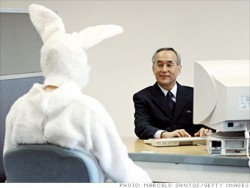How to Get a Job (from a hirer’s perspective)
I’ve changed jobs far too many times in my working life, and been to far too many interviews. One of my favorite jobs was working at a career center, where I helped others write their resumes and learn some interviewing techniques to get a job of their own.
Now, for the first time, I am on the other side of the desk. I get to see these resumes and conduct these interviews on a fairly regular basis, and live with the consequences of my judgment. And I’m not too far into it – only about 6 months – so I’ve not yet forgotten what it’s like to be at the mercy of someone like myself.
I started wishing I could send a note back to my former self, so that I could give all those people at the career center better advice on how to get a job. Sadly, I have not yet mastered time travel… so instead, I’ll see if I can help someone in the present. Now, of course, not all jobs are like the one I’m always looking to fill, and not all interviewers are like me, so nothing applies everywhere. But hey, maybe I can luck out and actually tell you something useful:
1. It doesn’t matter if your resume fits on to one page
When on the job-seeking side of things, I was told that any information past the first page of my resume won’t get looked at. This might be true at massive companies that deal with hundreds of resumes a week, but for anyone who will have to actually work with you if you are hired, they’ll read the whole thing. Now, if it’s long because it’s badly organized, or has too much fluff, that will reflect badly on you. But if it’s long because you have a long work history or a lot of skills, no one cares.
BONUS TIP: Many companies will initially select resumes to look at through a keyword search, so be sure to mention specific skills – software programs, certifications (spelled out AND abbreviated), basically anything searchable and useful.
2. If you can’t think of a good objective/summary, skip it
 I used to never know what to put for the objective. The objective/summary at the top of your resume is the first thing a hirer sees. If it says, “I seek to find a position that will let me use my skills and learn new things”, it gives the hirer no reason at all to read on. You are dull and colorless, and come off as not being able to think for yourself. Be specific, or skip it.
I used to never know what to put for the objective. The objective/summary at the top of your resume is the first thing a hirer sees. If it says, “I seek to find a position that will let me use my skills and learn new things”, it gives the hirer no reason at all to read on. You are dull and colorless, and come off as not being able to think for yourself. Be specific, or skip it.
BONUS TIP: You can really make great use of your objective by making it say you want to work at a place JUST LIKE the one you are applying for. This can be especially helpful if your experience doesn’t exactly match the job.
3. It’s all about the little things
Grammatical errors in your resume or any other correspondence… showing up late to your interview… mismatched clothing… never smiling or looking at the interviewer in the eyes… These things all speak volumes about how much of a hassle you are going to be to manage. Managers have much bigger things to worry about, so if they think they’re going to have to worry about your tongue-smacking habit every time you’re on the phone, they’ll run the other way screaming.
BONUS TIP: If you do end up making a mistake (i.e. showing up late), own up to it. If you prove you’re aware of your mistakes, then you prove you can still manage these little things yourself.
4. Answer the stupid question!
This is the biggest point I wish I could send back to my career-center self. I spent so much time coaching people to be confident, positive, etc. in an interview. Those things matter too, but they won’t matter at all if you don’t ANSWER THE QUESTION. If an interviewer asks you to give an example of a time you demonstrated leadership, and at least 90% of the words you respond with don’t have anything to do with a time you demonstrated leadership, you have just demonstrated that you can’t follow simple directions. You may think you have just pulled out your best rehearsed line, but the interviewer thinks you’re somewhere between dim and dishonest.
BONUS TIP: If you don’t know how to answer the question, ask for clarification (“Do you want to hear an example of when I was directly in charge of others, or merely inspired them?”). It shows critical thinking skills, and buys you some time. But again, make sure what you ask is directly relevant to the question.
5. They want you to be a bit like them
I had heard this one before, but now that I am in the position of hirer, I am embarrassed to realize it’s all too true. When looking for a job, I had been told to look for surface-deep similarities, mimicking their body language and such. It’s actually worse than that. A stiff and rigid interviewer is going to be looking for an ultra-professional person. An interviewer who cracks jokes is going to want someone with a sense of humor. An interviewer who gets excited easily is going to like the person who exhibits passion. It’s not usually conscious, but it’s human nature. Sorry about that.
BONUS TIP: Skip the body language mimicry. If you can pay attention to what kind of person your interviewer is, and bring out the parts of your personality that get along with that kind of person, it will take you far.
6. They want to like you
If any of this sounds a bit disheartening, then consider this – your interviewer wants to like you. Unless their job consists of nothing but screening candidates (which is rarely the case), they have already invested precious time in reviewing your resume, discussing your candidacy with others, carving out time for your interview, and sometimes more. If you’re no good, all of their time has been wasted. Granted, much more of their time will be wasted if they hire a difficult employee, but they’re hoping you’ll prove all their efforts worth while. Some interviewers might get a buzz out of the power trip, but most of them would be willing to overlook the stain on your shirt if you come off as a generally competent, intelligent, and amiable person.
BONUS TIP: Don’t get utterly crestfallen if you mess up somewhere!
So, there you have it. Think I’m wrong? Tell me so! Just don’t come try to work for me. 🙂





3 is key for me when hiring
It’s the toughest one as well, because every interviewer has their own hot points that are going to sound the death toll if crossed. For me, it’s grammar/spelling; for my boss, it’s dress. Which pretty much falls into #5, really.
Common Sense above all else!
The view is different from the other side of the desk … then again, similarities exist. Too bad politicians don’t take your suggestion about answering questions.
They often see themselves as being on the wrong side of the desk (managers, rather than employees), I think.
Really? Managers see themselves as on the wrong side?
Ah, sorry! What I meant was politicians see themselves as managers [of the public], rather than employees of the public.
Good point!!! Meanwhile, hope all is well with you!